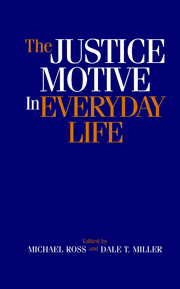Book contents
- Frontmatter
- Contents
- List of Contributors
- Introduction
- Theoretical Perspectives on the Justice Motive
- Victim Derogation and the Belief in a Just World
- The Justice Motive and Prosocial Behavior
- 11 Just World, Social Responsibility, and Helping Behavior
- 12 Policies to Redress Social Injustice: Is the Concern for Justice a Cause Both of Support and of Opposition?
- 13 Justice and Empathy: What Motivates People to Help Others?
- 14 The Justice Motive and Altruistic Helping: Rescuers of Jews in Nazi-Occupied Europe
- 15 Acting Righteously: The Influence of Attitude, Moral Responsibility, and Emotional Involvement
- Justice-Based Reactions to Transgressors
- Justice and Reaction to One's Own Fate
- Name Index
- Subject Index
13 - Justice and Empathy: What Motivates People to Help Others?
Published online by Cambridge University Press: 08 September 2009
- Frontmatter
- Contents
- List of Contributors
- Introduction
- Theoretical Perspectives on the Justice Motive
- Victim Derogation and the Belief in a Just World
- The Justice Motive and Prosocial Behavior
- 11 Just World, Social Responsibility, and Helping Behavior
- 12 Policies to Redress Social Injustice: Is the Concern for Justice a Cause Both of Support and of Opposition?
- 13 Justice and Empathy: What Motivates People to Help Others?
- 14 The Justice Motive and Altruistic Helping: Rescuers of Jews in Nazi-Occupied Europe
- 15 Acting Righteously: The Influence of Attitude, Moral Responsibility, and Emotional Involvement
- Justice-Based Reactions to Transgressors
- Justice and Reaction to One's Own Fate
- Name Index
- Subject Index
Summary
A core premise of the social psychology of justice is that people's attitudes, feelings, and behaviors are shaped by their subjective judgments about what is right or wrong, just or unjust, ethical or unethical (Tyler et al., 1997). This fundamental argument is now supported by a large and diverse body of literature. However, this was not always the case, and the work of Mel Lerner, both in his influential just world hypothesis (Lerner, 1980) and through several influential theoretical articles pointing out the broader implications of the justice motive (Lerner, 1981, 1982), has had a great deal to do with encouraging social psychologists to think seriously about the nature and importance of justice. Our goal in this chapter is to build upon Lerner's articulation of the existence of the justice motive, as well as upon the now large literature documenting the range and importance of the influence of people's concerns about justice. We do so by considering one core distinction within social psychology that we feel is underdeveloped at this time – the distinction between justice and empathy. Justice and empathy share (at least) one important behavioral influence. Both lead those who possess resources and/or power to help others who are needy or in distress. Understanding justice and empathy therefore also helps us to understand when and why people come to the aid of victims.
- Type
- Chapter
- Information
- The Justice Motive in Everyday Life , pp. 226 - 250Publisher: Cambridge University PressPrint publication year: 2002
- 15
- Cited by

